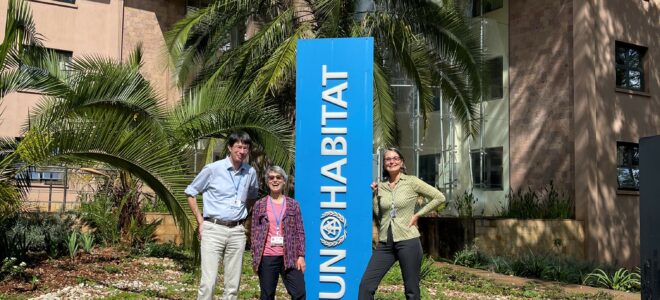The second session of the ad hoc Open-Ended Working Group (OEWG-2) on the Science-Policy Panel on Chemicals, Waste and Pollution Prevention is taking place in Nairobi, Kenya, from December 11 to December 15, 2023. Three IPCP Board Members are in attendance and are providing their daily summaries.
Today the Science & Technology Major Group made plans to organize a group open to scientists that would focus on the development of the SPP from OEWG-2 to OEWG-3 and on to the actual establishment of the SPP by an intergovernmental meeting after OEWG-3, and possibly also continue to work on a longer-term basis to provide input to the SPP’s work when it is established.
In the morning plenary, contact groups (i) and (ii) reported back to the plenary and asked for more time to continue their work on conflict of interest, operational principles, capacity building, and institutional arrangements. The plenary decided to provide more time for this work, but there were also voices pointing out that progress was rather slow and there was only today (Thursday) left for contact-group work while many unresolved questions remained in all the in-session documents (see tab “in-session documents” on the OEWG-2 page). It became clear that the OEWG-2 meeting would mainly collect all the different views and opinions, reflected by different versions of the text of the in-session documents, but that the diverging views would not be reconciled, implying that many important issues would be resolved only at OEWG-3 in Geneva in June 2024. The plenary adopted a provisional agenda for OEWG-3. Two additional contact groups on work-related processes and procedures and on intersessional work, i.e. work between OEWG-2 and OEWG-3, were also established.
An important question from the point of view of non-governmental participants and in particular the Major Groups, was the procedure for nomination of experts in the various bodies of the SPP, in particular the Interdisciplinary Expert Panel that would shape the work program of the SPP. Major Groups representatives discussed this with several government delegates, and it turned out that also this question will remain open until OEWG-3.
The IPCP delegation again attended contact groups (i) and (ii). In contact group (i), it became clear that the proponents of the two different concepts for capacity building had not departed from their views and that a lot of negotiation will be needed to find a common ground. Representatives of the IPCC Secretariat, the Ozone-Depletion Secretariat, and the Secretariat of the Basel, Rotterdam and Stockholm Conventions provided helpful and informative explanations of how capacity building is organized in these three areas.
In the discussions about operating principles and conflict of interest, a range of widely varying and diverging views became apparent. This included the topics of, among others, the precautionary approach, a human-rights-centered approach, responsiveness to the needs of developing countries, and the weight that should be given to “prevention”. It was surprising and irritating to see the depth of the disagreements on such fundamental aspects of environmental policy.
A similar situation was observed in the discussion of conflict-of-interest provisions. A wide range of different views was expressed, regarding the question of who decides if an interest is so relevant and significant that it needs to be disclosed, and what types of interests these relevant and significant interests include; to what extent previous interests need to be included; and if a wide range of interests related to commercial, government, or industrial information should be excluded from the obligation of disclosure (which would run counter to the very intention of the conflict-of-interest provisions for the SPP). What was agreed on by the group was the separation of the COI Disclosure Form into two parts, one for financial and one for non-financial interests, which directly implements the intervention made by the IPCP Chair, Martin Scheringer, on Day 2 of the OEWG-2 session.
In contact group 2, under the topic of institutional arrangements, the document INF/10/Rev.1, “Draft text for proposals to establish a science-policy panel”, was discussed see here, tab “Pre-session documents”. In the Annex to this document, paragraph 17, which acknowledges the participation of major groups and stakeholders, remains in the document, but it was put into brackets, which means that it is not agreed on and will have to be discussed again at OEWG-3. Overall, the group was able to complete its work on section C (institutional arrangements) and D (evaluation of operational effectiveness and impact of the panel) of the document by including all of the interventions of the member states with some consensus, but with many remaining interventions that have not been resolved. The secretariat will provide a revised set of the document as early as possible for member states and stakeholders to review more carefully.
Contact group 3 reviewed a working structure of the SPP and also reviewed criteria for requests made to the SPP for assessments or other products to be prepared by the SPP.
Overall, it was again a very long day of hard work by delegates and facilitators. A lesson learned is that the countries of the world have widely diverging views on many important aspects of chemicals policy and chemicals management.
—
Longer daily reports prepared by the International Institute for Sustainable Development, Earth Negotiations Bulletin are available at: https://enb.iisd.org/oewg2-science-policy-panel-contribute-sound-management-chemicals-waste-prevent-pollution
